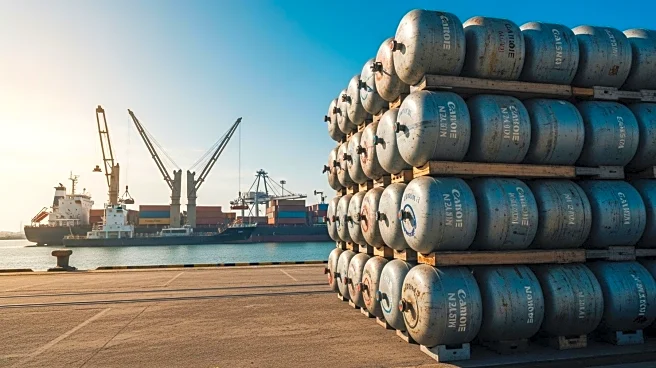What is the story about?
What's Happening?
Ports across the United States are increasingly turning to propane as a reliable and cost-effective energy solution amidst fluctuating trade volumes and economic uncertainties. Propane offers significant advantages over traditional fuels like diesel and gasoline, which are subject to volatile global oil market conditions. As a domestically produced energy source, propane provides a stable supply chain and predictable pricing, helping ports manage operational costs more effectively. The West Basin Container Terminal at the Port of Los Angeles, for instance, has reported substantial savings after switching from diesel to propane, reducing annual fuel costs by approximately 25%. Additionally, propane-powered equipment requires less maintenance and infrastructure investment compared to electric alternatives, further enhancing operational efficiency.
Why It's Important?
The adoption of propane by U.S. ports is crucial in maintaining economic stability and operational resilience during periods of trade uncertainty. By reducing dependency on volatile global oil markets, ports can better manage their budgets and reinvest savings into their operations. Propane's lower infrastructure and maintenance costs compared to electric solutions make it an attractive option for ports looking to upgrade their equipment without incurring high upfront expenses. Furthermore, propane's ability to provide off-grid energy solutions enhances ports' resilience against electrical grid failures, which are becoming more frequent due to aging infrastructure and increased power demand. This strategic use of propane ensures that ports can continue to operate efficiently and meet the demands of global trade.
What's Next?
As ports continue to face economic uncertainties and tariff fluctuations, the role of propane as a strategic energy asset is likely to grow. Ports may further invest in propane infrastructure and equipment to enhance their operational resilience and cost-effectiveness. Additionally, the potential increase in electrical grid failures could drive more ports to adopt propane-powered backup systems to ensure uninterrupted operations. Stakeholders, including port operators and energy suppliers, may explore long-term contracts and partnerships to secure stable propane supplies and pricing. The ongoing shift towards propane could also influence policy discussions on energy security and infrastructure development at the national level.
Beyond the Headlines
The shift towards propane in port operations highlights broader trends in energy security and sustainability. As ports seek to reduce their carbon footprint and enhance resilience, propane offers a cleaner alternative to diesel, contributing to environmental goals. This transition may also spur innovation in propane technology, leading to advancements in efficiency and emissions reduction. Moreover, the increased use of propane could influence the energy market dynamics, potentially affecting pricing and supply chains. The strategic adoption of propane by ports underscores the importance of diversifying energy sources to mitigate risks associated with global trade and economic fluctuations.















